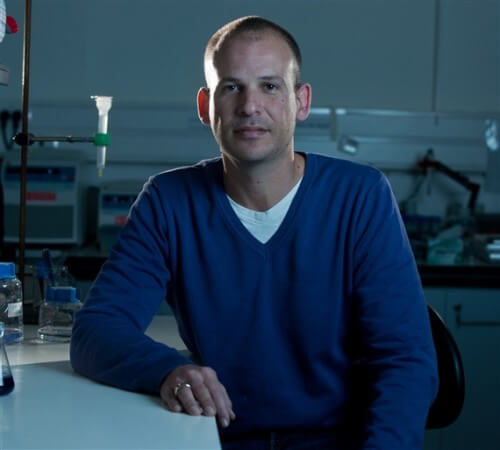The prize for young researchers is awarded on behalf of the Wolf Foundation for his contribution to the development of specific proteins for the treatment of cancer

Dr. Niv Papo from the Department of Biotechnology Engineering in the Faculty of Engineering Sciences at Ben-Gurion University and the National Institute of Biotechnology, won the prestigious Krill Award for excellence in scientific research for 2014. Dr. Papo won the award for his contribution to the development of specific proteins for the treatment of cancer.
Dr. Pepo recently won an award and a large and prestigious research grant for young researchers from the Prostate Cancer Foundation (PCF) for his research in the development of specific proteins for the treatment of cancer. The award was given to him as part of the annual scientific conference for prostate cancer research, held in Washington. Dr. Pepo is developing new proteins that promise to help both in the diagnosis process and in the treatment of cancer. His research deals with the development of new molecules that will be able to understand what a cancer cell is and distinguish between cancer cells and healthy cells. This is a groundbreaking possibility, since the existing standard treatment is chemotherapy, which attacks all cells in the body, whether healthy or not. In this way, this type of treatment can prevent many side effects associated with cancer treatment, such as hair loss, nausea and weakness, and actually improve the patient's quality of life.
Dr. Pepo received the award for the development of multispecific proteins that focus on several receptors on the surface of the cancer cell, for applications in the field of prostate cancer imaging and its treatment. The goal is to produce transgenic proteins, which will be able to inhibit the process of blood vessel formation in the cancerous area only and the spread of the cancer to form metastases (signs of prostate cancer).
The work of Dr. Pepo and his research team in the Department of Biotechnology Engineering and the National Institute of Biotechnology is characterized as a process known as "Theranostics", in which the diagnosis and treatment, using a new protein medicine, is personally adapted to the patient. This form of treatment is part of the transition processes to personalized medicine, which is adapted to the patient and refers to his needs, and is based on the ability of the engineered proteins to diagnose (locate) and treat cancer metastases at the same time. "In diagnosis, we want the protein drug, which is also used as a diagnostic marker, to be quickly cleared out of the system. But for treatment, we are interested in the drug remaining in the body for long periods of time to make it easier for the patient." Dr. Pepo explains. Dr. Pepo's research group deals with drug engineering and the ability to control the time the drug remains in the body, its distribution in the various organs and its specificity for cancer cells. The ability to direct the clearance time from the body in advance may help in the development of a drug with optimal diagnostic and therapeutic capacity.
Beyond that, Dr. Pepo also holds the rights to research based on a protein with therapeutic and diagnostic capabilities that will help delay the development of cancer and the development of the next generation of drugs designed to treat this disease. According to the Cancer Society, in recent years there has been a downward trend in mortality from the disease, and this is due to an improvement in patient survival, as a result of extensive outreach processes, which encourage methods of prevention and early detection by the department, as well as improvement in treatment and rehabilitation methods.
It should also be noted that Dr. Niv Papo recently won a large and highly prestigious research grant for young researchers from the European Research Council (ERC) for his research on the development of multi-specific proteins for the treatment and imaging of cancer. This is an amount of 1,625,000 euros for a five-year research period.
The Krill Awards for excellence in scientific research are given in memory of the late Binyamin and Gitla Krill Mansbach Schlanger. The awards are intended for outstanding academic staff members, at the rank of lecturer or senior lecturer who have not yet received tenure, who are employed at one of the universities in Israel. Six awards of $10,000 each are awarded annually, in the fields of exact sciences, life sciences, medicine, agriculture and engineering. The winners are selected by the Wolf Foundation's scholarship committee from outstanding candidates submitted by the universities in Israel. The selection is made according to criteria of excellence and the research topic and its importance. The awards are funded by the Krill family and were awarded for the first time in 2005.

One response
Excellent - and extremely important for every man who knows what the disease is like over the age of eighty: hurry up to find treatment!